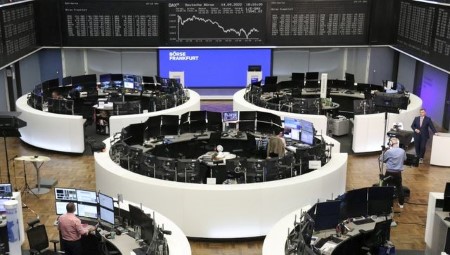




Inflation Update: Weak demand softens shocks
 DOWNLOAD
DOWNLOAD

Monthly Economic Update: Fed cuts incoming
 DOWNLOAD
DOWNLOAD

Consensus Pricing – June 2025
 DOWNLOAD
DOWNLOAD


TOP SEARCHES
European shares fall for third day on oil, tech losses

Sept 15 (Reuters) – European equities gave up earlier gains to end lower on Thursday, with energy and technology shares declining the most, as worries about tighter monetary policy and geopolitical disruptions shook risk sentiment.
The STOXX 600 index closed 0.7% lower, extending losses to a third straight session. A slump in crude prices on demand worries pulled energy shares down 2.1%.
Technology stocks fell 1.8% and were the biggest drags on the STOXX 600. The sector typically underperforms in a high interest rate environment on concerns over pressure on future earnings.
A bevy of data this week from the United States has further strengthened the case for a hawkish Federal Reserve. The Fed is seen delivering its third 75-basis-point hike next week, while the European Central Bank raised by that much this month and signaled more would follow.
“The market remains extremely volatile. There is a fight going on between the bulls and the bears and every data point that comes out gives more arguments to one or the other,” said Andrea Cicione, head of strategy at TS Lombard.
“Strong (US) job market, strong consumer, strong sales means the Fed needs to go further and that’s causing the market selloff. And likewise, geopolitics remain extremely volatile.”
Amid Western sanctions on Russia over its invasion of Ukraine, China on Thursday said it would work with Moscow to “instil stability and positive energy in a chaotic world”. Worries of a gas crisis in Europe due to the war have seen the bloc’s leaders scramble to introduce support measures for companies and citizens.
European banks rose 1.7%, supported by bets of higher interest rates. Morgan Stanley upgraded the banking sector to “overweight”, citing cheap valuations and resilient earnings.
Spanish banking stocks including Bankinter, Sabadell and Caixabank rose more than 4% each after a report stated that Madrid is keen to avoid conflicts with the European Central Bank and could modify a bank tax.
H&M dipped 4.7% after the retailer posted lower-than-expected quarterly sales as shoppers tightened their belts amid soaring energy and food bills and as it struggled to compete with rival Zara.
(Reporting by Shreyashi Sanyal, Shashwat Chauhan and Susan Mathew in Bengaluru; Editing by Devika Syamnath)
This article originally appeared on reuters.com





 By Reuters
By Reuters